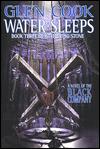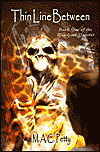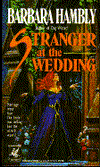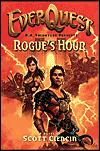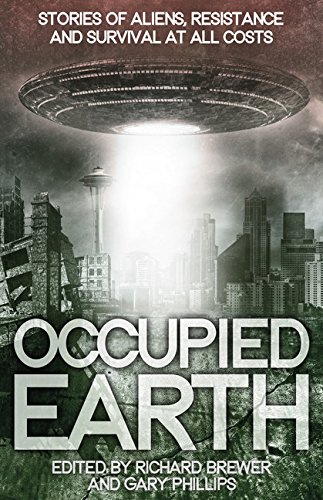Midnight Tides, by Steven Erikson
Book Review by Howard von Darkmoor
Have you read this book?
Ah, another chapter in the Erikson epic "Tale of the Malazan--Book of the Fallen." Well, another 25 at least. Another wonderful read, too.
Midnight Tides takes a slightly different tack than previous Malazan books. Outside of the three novellas Erikson has penned thus far in the "Tales of Bauchelain and Korbal Broach" (downright hilarious at times, if I say so myself) and the situational humor of his previous novels, none of them had such the humorous bent as this one. In fact, the first 3/4ths of the novel is laced with more humor than all of the preceding 4 combined. Yet with one of the more stunning climaxes in the series - it runs a full 2 chapters, roughly 75 pages, long - it manages a return to humor, though somewhat somber, in the final sections. The most ironic aspect of this is, to me this is one of the most melancholy tales I've read in a long time.
Erikson's prose is again so exquisitely well-written it directs its reader like a full orchestra. Playing emotions off intellect, observation off interaction, and somberness off silliness, Erikson conducts a masterful effort. It will take a lot to displace "Memories of Ice" in my mind as the greatest book I've read in a loooong time, and "Deadhouse Gates" is a killer of a novel, but this Midnight Tides shows a real maturation in Erikson's storytelling and writing skills. Each book has shown the steady progression of his skills, an amazing feat of quantity and quality in a rather short time span compared to many other authors out there, even compared to society in general. I do not believe I can recommend these stories enough.
Midnight Tides follows the same idea of House of Chains, taking the reader deep into the personal life of one major character and just about as deep into the lives of several co-relatable others, both primary and secondary. It devotes itself to the backstory of a single character known from the previous books and contemporaneous with events we've already read about.
As usual in an Erikson novel, there are the astute observations from countless characters upon a wide range of subjects, mostly simply life itself. Erikson's characters definitely prove the adage that "Life is a comedy to those who think." It is not all fun and games here, though, with serious observations on the mentality, cultural mores and nature of gods, urges, and the pains of the world. Mixed among the humor, the starkness, the somberness, and the sometimes silly is one of the scariest statements Erikson has ever written. For those in the know, those who understand, nothing is as stunning as the complete and utter unexpectedness of ". . . now that the tower was dead." (p. 292)
Overall, this is an examination of the misery of much of existence beneath the multitudes of facades we create, individually, among ourselves, about our societies, our reasons, even our happinesses and most assuredly our sadnesses. It is about the duplicity we experience and generate in our world and in our souls. It is about being alone only to find out that we were not once it becomes too late to matter.
Yet it is also about the slight chance of hope, the small ray of promise, that a few - oh, so very few - find in friendship and honor. It is not often one can claim to enjoy reading something that brought feelings of loss and sadness, that left me blue upon completion. There is some small hope, for there are several indications certain personages will be seen again.
Odds and ends: There is one terrific surprise identity (for me, at least, and that doesn't happen often either), and a few more things fall into place in regards to the events of previous novels. However, this is the first book in the series that created one or two 'Why?' questions for me in regards to certain subplots, such as the almost-novel length but then abruptly cutoff subterfuge of market-cornering and timing meant to overthrow things.
"Deadhouse Gates" left me deeply impressed. "Memories of Ice" left me in awe. "House of Chains" left me somewhat underwhelmed. This novel has affected me quite differently, leaving me thoughtful and somewhat saddened. Would I recommend Midnight Tides by Steven Erikson to my friends? Most assuredly, emphatically, and repetitively yes!
Erikson's prose is again so exquisitely well-written it directs its reader like a full orchestra. Playing emotions off intellect, observation off interaction, and somberness off silliness, Erikson conducts a masterful effort. It will take a lot to displace "Memories of Ice" in my mind as the greatest book I've read in a loooong time, and "Deadhouse Gates" is a killer of a novel, but this Midnight Tides shows a real maturation in Erikson's storytelling and writing skills. Each book has shown the steady progression of his skills, an amazing feat of quantity and quality in a rather short time span compared to many other authors out there, even compared to society in general. I do not believe I can recommend these stories enough.
Midnight Tides follows the same idea of House of Chains, taking the reader deep into the personal life of one major character and just about as deep into the lives of several co-relatable others, both primary and secondary. It devotes itself to the backstory of a single character known from the previous books and contemporaneous with events we've already read about.
As usual in an Erikson novel, there are the astute observations from countless characters upon a wide range of subjects, mostly simply life itself. Erikson's characters definitely prove the adage that "Life is a comedy to those who think." It is not all fun and games here, though, with serious observations on the mentality, cultural mores and nature of gods, urges, and the pains of the world. Mixed among the humor, the starkness, the somberness, and the sometimes silly is one of the scariest statements Erikson has ever written. For those in the know, those who understand, nothing is as stunning as the complete and utter unexpectedness of ". . . now that the tower was dead." (p. 292)
Overall, this is an examination of the misery of much of existence beneath the multitudes of facades we create, individually, among ourselves, about our societies, our reasons, even our happinesses and most assuredly our sadnesses. It is about the duplicity we experience and generate in our world and in our souls. It is about being alone only to find out that we were not once it becomes too late to matter.
Yet it is also about the slight chance of hope, the small ray of promise, that a few - oh, so very few - find in friendship and honor. It is not often one can claim to enjoy reading something that brought feelings of loss and sadness, that left me blue upon completion. There is some small hope, for there are several indications certain personages will be seen again.
Odds and ends: There is one terrific surprise identity (for me, at least, and that doesn't happen often either), and a few more things fall into place in regards to the events of previous novels. However, this is the first book in the series that created one or two 'Why?' questions for me in regards to certain subplots, such as the almost-novel length but then abruptly cutoff subterfuge of market-cornering and timing meant to overthrow things.
"Deadhouse Gates" left me deeply impressed. "Memories of Ice" left me in awe. "House of Chains" left me somewhat underwhelmed. This novel has affected me quite differently, leaving me thoughtful and somewhat saddened. Would I recommend Midnight Tides by Steven Erikson to my friends? Most assuredly, emphatically, and repetitively yes!
|
Click here to buy Midnight Tides, by Steven Erikson on Amazon
|
Midnight Tides, by Steven Erikson on Amazon
| More Books You Might Like |
Comment on Midnight Tides, by Steven Erikson
| Comments on Midnight Tides, by Steven Erikson |
| There are no comments on this book. |
